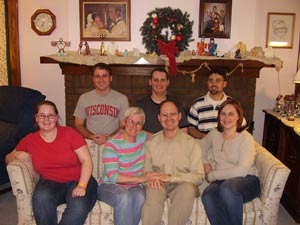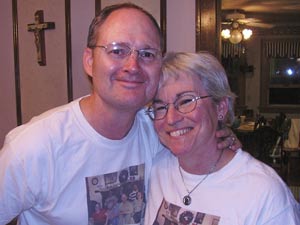 The Schum family poses for a family photo in 2004, the Christmas before 17-year-old Dave Schum died. Dave is pictured in the back row, center, behind his parents Tim and Mary Schum. Tim and Mary are featured speakers at “A Day for Healing for All Who Mourn the Death of a Child,” on Saturday, Nov. 13 at St. John Vianney Parish, Brookfield. (Submitted photo courtesy the Schum family)As if it were yesterday, Mary Schum remembers the day she found her 17-year-old son, David, dead by suicide. In a haze of anguish and unanswered questions, she shielded the grandchildren she was babysitting from her pain and contacted her son and daughter to pick up their children, while choking out the news that their brother was gone.
The Schum family poses for a family photo in 2004, the Christmas before 17-year-old Dave Schum died. Dave is pictured in the back row, center, behind his parents Tim and Mary Schum. Tim and Mary are featured speakers at “A Day for Healing for All Who Mourn the Death of a Child,” on Saturday, Nov. 13 at St. John Vianney Parish, Brookfield. (Submitted photo courtesy the Schum family)As if it were yesterday, Mary Schum remembers the day she found her 17-year-old son, David, dead by suicide. In a haze of anguish and unanswered questions, she shielded the grandchildren she was babysitting from her pain and contacted her son and daughter to pick up their children, while choking out the news that their brother was gone.
“I had to awaken my college daughter to tell her, and my older daughter had to call her brother in California to give him the news,” she said. “My husband, Tim, was at the airport awaiting a flight to a medical conference when the police had to contact him and tell him to come home.”
For parents who have lost a child, the pain is unlike any other. It is a grief that is visceral, piercing, inclusive and life-altering.
On March 4, 2005, the agony unfolded for the Schums.
Read the Schums’ suggestions for coping with loss of a child |
The youngest of five children, David suffered from bipolar disorder. He often cut himself to deal with his internal distress. Although Tim and Mary had him in therapy, David chose to go off his medication in December 2004.
“He’d survived other suicide attempts, so we were lucky to have him as long as we did,” explained Mary. “Dealing with his death was the biggest event in our family’s lives. Entering into grief is a unique experience. It is uncharted territory and it completely changed everything in my life.”
Death was blow to professional confidence
For Tim, a pediatrician and teacher at the Medical College of Wisconsin’s primary care clinic, the Downtown Health Center, David’s death rocked his soul as well as his professional confidence.
“I think my confidence was shaken more because of my profession,” he said. “I am trained to save lives, but here I couldn’t even save my own son’s life.”
With the help of their four other children, Joy, Paul, Daniel and Clare, the couple tried to find an explanation for their son’s and brother’s death.
“The emotional drain is tremendous,” said Mary, adding, “It felt like being weighted down with lead weights all over my body. It was exhausting and sleep was difficult. We met with our family therapist who had been seeing Dave for years. Regular sessions with her were very helpful.”
Two and a half years into their grief, Tim learned of a worldwide support group, The Compassionate Friends, a group for parents, siblings and other family members grieving the loss of a child.
Compassionate FriendsContact: Chapter Leader Rosemary Albrecht, (414) 764-5668. Third Tuesday of each month, 6:30-8 p.m. Oak Creek Community Center, 8580 S. Howell Ave., Oak Creek, WI 53154 |
“When I attended my first meeting, I knew this was for me,” said Tim. “Here I could speak freely. I knew that everyone there had gone through the same painful experience. When others spoke about something that happened to them (after losing their child), I immediately realized the same had happened to me sometime.”
Couple leaned on their faith
As members of Holy Assumption Parish, West Allis, Tim and Mary, both 59, relied on their faith and God’s grace to make it through each day.
“I am convinced that the love in our family, among all of us, still unites us to Dave,” said Mary. “We are still a family united by love.”
Through meeting with others, sharing their stories and pain, and talking
Day of Healing for those mourning the loss of a childSt. John Vianney Parish, 1755 N. Calhoun Road, Brookfield, hosted by the parish Elizabeth Ministry, Nov. 13, from 9 a.m. to 3:30 p.m. in the parish center. The day includes presentations in the morning and afternoon, small group discussions and concludes with a·memorial service. Featured speaker will be Dudley Riggle, nationally known for his work with grieving and dying, and parents who have had a child die. Cost of the day is $12 per person, and it includes lunch and snacks. To register, contact Bonnie at (414) 758-2240 or bresnahanb@archmil.org. |
together as a family, the Schums began to heal and guide their pain toward helping others going through similar crises.
A grief program was instituted at Holy Assumption and Mary and Tim continue to facilitate the follow up support group meetings.
When Clare left home the fall after David’s death to attend law school in New York, Mary, a stay-at-home mom, attended a private retreat and met with aspiritual director.
“In the next year, I enrolled at Cardinal Stritch and graduated in December 2008 with a master of arts in lay ministries,” she said. “My pastoral project was on using small groups in parish bereavement ministry. Currently, I am doing my second unit of clinical pastoral education at St. Camillus, learning to better serve the needs of people who are experiencing multiple losses in their lives.”
Dad relates to parents, teens differently
As a pediatrician, Tim can relate to parents who have suffered the death of a child because, like them, he has experienced great loss.
“I also relate to teens a lot differently,” he said. “I am always on the lookout for potential suicide or self-mutilation signals. So I also teach the next generation of physicians what to do and a little about what it is like. I also am a participant in a seminar held every year for our second-year pediatric residents. The seminar is titled, ‘Coping with the dying patient.’ At that seminar, I go over what my grief is like and some of the coping strategies for me.”
While the family battles painful memories, visions of vibrant young men David’s age, and the whys and what ifs surrounding their loss, Tim and Mary share their heartache and coping mechanisms with others. The couple will be guest speakers at an archdiocesan Day of Healing for all those who mourn the death of a child on Saturday, Nov. 13, at St. John Vianney Parish, Brookfield.
 On what would have been Dave Schum’s first birthday following his death in 2005, his parents Tim and Mary Schum, above, and friends from Pius XI High School celebrated with a remembrance ceremony at the cemetery, followed by supper and cake at the Schum home. (Submitted photo courtesy the Schum family)They aim to compassionately relate to others in similar situations and offer hope and suggestions to survive.
On what would have been Dave Schum’s first birthday following his death in 2005, his parents Tim and Mary Schum, above, and friends from Pius XI High School celebrated with a remembrance ceremony at the cemetery, followed by supper and cake at the Schum home. (Submitted photo courtesy the Schum family)They aim to compassionately relate to others in similar situations and offer hope and suggestions to survive.
“My presentation will include what I felt both initially and over the ensuing several years,” said Tim. “I will share how much emotional energy grief consumes. I will share about how many triggers there were for me, in particular for my occupation, caring for teens and for parents, who also had a child die.”
While both suffered tremendous sadness and lack of emotional energy, Tim remembers daily discussions surrounding the same topics, dealing with triggers, post traumatic stress syndrome, decreased appetite, trouble sleeping and the all consuming sadness that David was gone and would never be with them on earth again.
Tim and Mary read books and other materials on grief, and through their study, Tim learned that David’s bipolar illness is a chemical imbalance where the pain of depression and living is worse than the pain of dying.
“I read a book about suicide and one phrase in particular stood out for me: ‘Suicide can be thought of as the worst possible decision in a mind that can no longer function in a rational manner,’” he explained.
Grief process different for mom, dad
While agonizing for both, the grieving process was notably different for each. Tim tried to bury himself in his work, but lacked the energy to do so. Mary cried more, and while Tim cried, he often wondered why he couldn’t express his grief as freely.
“There is no doubt that Dave’s death was hard on both of us,” he said. My wife has been a stay-at-home mom. So I think one of the ways we were different was that she had put so much of her life’s work into raising Dave and our other children that it shook her confidence as a mom. I don’t know how to compare my time at work with her efforts to care for the grandkids and her efforts at the parish. I thought I would be back at work full time easily within two months. That turned out to be completely outrageous. I didn’t get back up to a 40-hour week for a least a year or more.”
Tim found comfort in two phrases from the New Testament during the most difficult moments of his grief. “My God, my God, why have you forsaken me!” and “Blessed are those who mourn for they shall be comforted.”
“The first I felt immediately, and the second as I was further along in my grief process,” he said. “One of the ways I coped was to stop by the Marian Shrine on 68th Street. I would just sit there in the presence of Mary, the mother of Jesus and of all of us. To me, she was one of the few that could understand what it was like. Her son also died. So, my relationship with her grew during this whole turn of events.”
Through David’s death, they have learned to appreciate each day as a gift from God.
“Life is a mystery and there is no logic to the way things work out,” said Mary. “I hope to someday see God’s wisdom in everything. I know that God is the God of new beginnings: each day, each new child, each new moment. There is beauty all around us, superfluous, gratuitous, generous beauty and wonder.”
